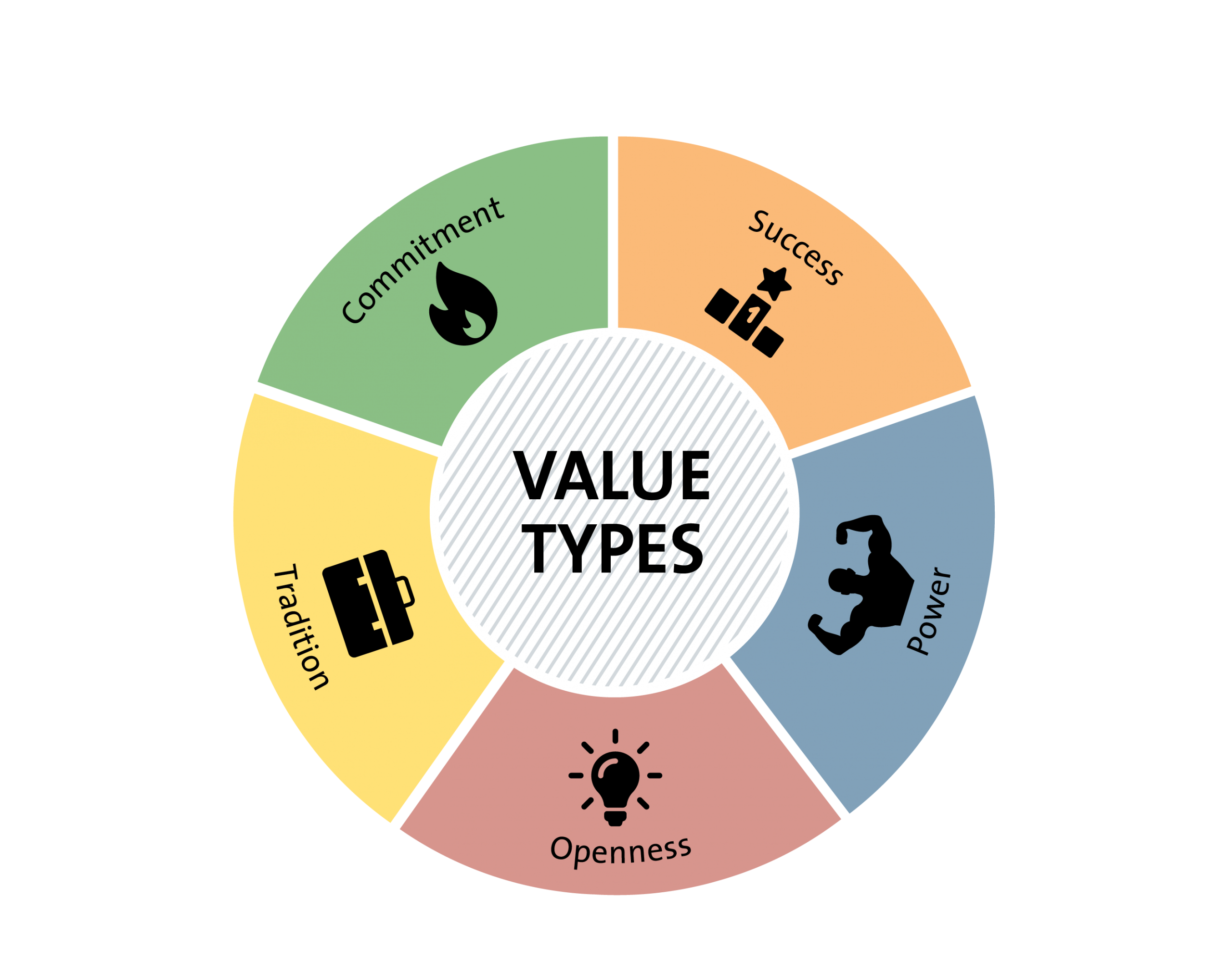Insights from our research
Every company has unique values and its own culture. In our studies, we have identified five basic patterns:
Success
Ambition paired with the pursuit of further development. Employees are being empowered and are just as much in focus as customers.
Power
Performance and achievements are in the foreground. The company as a whole and the upholding of its tradition are even more important than individual employees.
Openness
Sustainability, openness and creativity – preferably as a team – are the essential keywords to which success is subordinated.
Tradition
The preservation of tradition and the importance of people (employees and customers) for the company are characteristic.
Commitment
The individual employee is at the centre. The company lives from the commitment, creativity and curiosity of its employees.

Insight 1
The employee's satisfaction is connected with the values
The (perceived) values of a company have a strong influence on employee satisfaction: With 76% satisfied employees, success-driven companies achieve the highest values. In power-driven companies, on the other hand, not even every second employee is satisfied (43%).
Also relatively dissatisfied – and perhaps surprisingly dissatisfied at first glance – are employees in openness-driven companies: Only 58% describe themselves as satisfied. The central values of sustainability, openness and creativity might spontaneously lead one to assume a higher level of employee satisfaction. However, for all the openness in these companies, there seems to be a lack of focus and thus a lack of self-efficacy among the employees: Only 57% feel that their work advances the company – in success-driven companies this value is 82%.
Only 62% say that the goals and values of their organisation are clear to them (in comparison: 86% in success-driven companies). Thus, a lack of orientation seems to be similarly problematic for employees as the dominance of the success and power ambitions in power-driven companies.


Insight 2
One does not have to save the world: Purpose is not a privilege of social professions
Purpose is often (mis)understood as requiring a company to strive for a higher goal, i.e. – to put it somewhat exaggeratedly – to contribute to saving the world. From the workers' point of view, however, purpose is much more about the sense of meaning that they experience in their work.
When asked whether they experience their work as meaningful, 68% of the 2,000 workers surveyed said that this is the case for them. Health care (75%) and education & training (83%) achieve above-average values. However, the construction industry (78%) and the IT sector (70%), for example, also achieved very high values.
In addition, the strong influence of the corporate culture on the perceived purpose is also evident here: 82 % of employees in success-driven companies state that they consider their work to be meaningful. In power-driven companies, only 56% are of this opinion.
Insight 3
Mobile working: Progressive companies find it easier
28% of employees worked exclusively or predominantly mobile during the pandemic at the beginning of 2021. In success- and commitment-driven companies, this figure reached 34% each. In traditional companies, mobile working was less common – 26% reported that they were not or only occasionally at their actual workplace during the pandemic. Only the power-driven companies reported a rate of 21%.
The latter seem to put a high value on keeping their employees close to them and may have more difficulty accepting the lower level of control that mobile working offers.


Insight 4
Covid crisis management: Success orientation and crisis management go along hand in hand
A total of 61% of the employees rate their employer as having good or very good crisis management during the pandemic.
However, the positive effects of a company's value orientation are again evident here: in success-driven companies, 77% of respondents are satisfied with the crisis management, while this value drops to 48% in power-driven companies.
In success-driven companies, employees also feel significantly better protected than in power-driven companies (78% vs. 50%).
While success-driven companies "know how to handle a crisis", openness-driven companies have similar difficulties as power-driven companies: They only achieve slightly better values of 54% for satisfaction with crisis management, and the same proportion of employees only feel well protected against Covid in the workplace.
Insight 5
Employees want equality rather than diversity.
In a survey of 1000 representatively selected employees, the participants were asked to assess the developments in companies in 2030 and also to indicate how desirable these developments are from their point of view.
For example, equality of all employees regardless of gender, age or nationality is only expected by 32% of respondents – however, 80% would like to have equality achieved.
On the topic of diversity, by contrast, slightly more people (41%) expect companies to have more diverse workforces in 2030 than they do today. However, such a more diverse workforce is also only desired by 55% of employees.
These results are largely independent from the value orientation of the company – a clear indication that changes in society are more necessary for these topics than isolated measures in companies.

